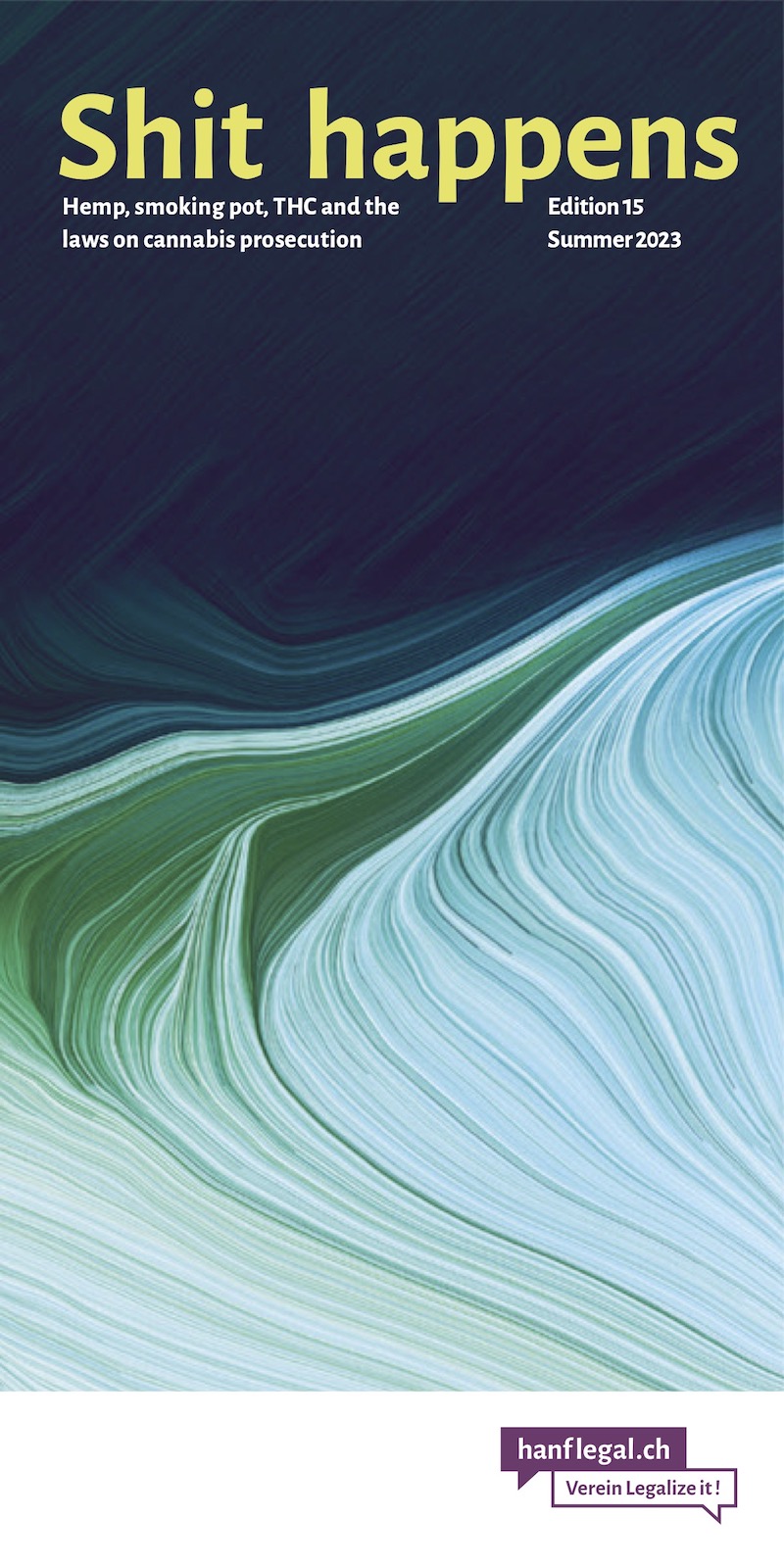- THC & Law:
Legal for all: food with THC traces
Laws
THC limits for foodstuffs
Contaminants Ordinance VHK, SR 817.022.15 (search for "tetrahydro")
Approved hemp varieties
As of 1.1.2020, there are no longer restrictions on varieties that remain below 1% THC (the variety catalog has been repealed).
Conditions
Food products with traces of THC are legal only if the limits are respected. Furthermore, no substance containing 1.0% THC or more may be used in production. So, for example, you can't grind hash and then mix it with a lot of tobacco and sell it.
Tips
A positive urine test for THC degradation products only indicates that someone has ingested THC. Whether this comes from a joint or from hemp edible oil cannot be determined with the rapid tests. A positive urine test therefore says nothing about whether someone has smoked pot illegally.
Penalties
Anyone who exceeds the THC limits for foodstuffs in their hemp products sold will be fined up to 80,000 francs. If the THC levels of the products or the intermediate products reach the 1% mark, the NarcA (misdemeanor, since transfer) will take effect.
Legal for all: food with THC traces
Permitted THC
Yes, there is legal THC consumption. It is also legal to sell certain products containing THC. However, the limits are so low that psychoactive effects will never occur (and of course that is the intention of these regulations).
Whereas the limits used to be up to 50 mg/kg, the highest permissible value is currently 20 mg/kg:
The limits for THC in food (in milligrams per kilogram)
| 20.0 | hemp seeds oil |
| 10.0 | hemp seeds (based on dry matter) |
| 5.0 | Spirits (based on pure alcohol, mg/l) |
| 2.0 | Baked and long-life bakery products (based on dry matter) |
| 2.0 | Pasta (based on dry matter) |
| 1.0 | Vegetable foodstuffs (other; based on dry matter) |
| 0.2 | Non-alcoholic beverages (based on ready-to-drink preparation) |
| 0.2 | alcoholic beverages (except spirits) |
| 0.2 | Herbal and fruit tea (based on ready-to-drink preparation) 1) |
Expressed in percentages, we thus arrive at values of 0.00002 to a maximum of 0.002% THC. These are the THC doses without intoxicating effect that are allowed in food.
Low THC flowers are also offered as smoked products. There, the THC content may then be up to almost 1%.
Urine tests quickly become positive
If someone regularly consumes legal hemp products with traces of THC, a urine sample may well indicate positive for THC degradation products, even though this person has not smoked pot at all. This puts the significance of urine tests into perspective.
In blood, however, a forensic institute can also determine the THC content quantitatively and no one comes with food to the values that, for example, regular joint smoking produces.
The testing machinery is constantly improving and becoming faster, but this does not change the fact that THC can also be consumed legally – and that traces of THC degradation products may have formed even without illegal consumption.
Nevertheless: Because the proof of abstinence is still controlled by urine samples or the THC degradation product (THC-COOH) contained therein, one must completely renounce the intake of THC, even legal!
THC Testing
For comparison: limits for morphine
Incidentally, there is a similar phenomenon with poppy seeds: anyone who eats poppy seed rolls can test positive for opiates. Accordingly, there is also a limit for morphine (the active ingredient in poppy seeds, calculated as a base), which is 30 mg/kg for poppy seeds, somewhat higher than for THC.
What does the narcotics law say?
For comparison, the current narcotics law defines all products containing at least 1.0% THC as illegal narcotics. The cultivation of the legal varieties can therefore result in problems: When prosecutors order a measurement, individual results may be slightly above the 1.0% THC – whether due to good weather conditions or natural fluctuations. Even if courts have already acquitted affected farmers: Such criminal proceedings alone mean a large amount of additional work.
Whoever grows legal hemp in Switzerland will pretty much have to talk to the authorities, experience (senseless) thefts - and also the neighborhood has to be reassured…
Despite these inconveniences, legal hemp production has never completely disappeared.
Legal hemp products on the market
Hemp cooking oil can be found in many health food stores, not quite cheap, tart-nutty and often only refrigerated storable. hemp seeds for eating are also offered there and now also by the wholesalers, especially the peeled ones are popular. These products are also produced in Switzerland, but then have their price.
Cords made of hemp can be found in office supply stores, mostly from foreign production, as well as hemp braids as sealing material. Such products are made of 100% hemp. Depending on the fabric, hemp fabrics for clothes are also made entirely of hemp, there are also mixed fabrics with cotton content. Hemp dresses can be found in natural textile stores. Hemp curtains are also offered.
Wholesale distributors offer various teas and ice teas, a small part of which is made from hemp and mixed with other tea herbs. There are beers in which the hops (the closest relative of hemp, by the way) are partly replaced by hemp flowers and leaves.
New products are constantly being added here, although the effective hemp content is often not too large (e.g. cream cheese with hemp pesto, mayonnaise with hemp, hemp pizza dough or spread with hemp). Shampoos, hand creams and other body care products are also enriched with hemp.
All these products are not narcotics and do not drive in. The foods contain only trace amounts of THC - the little bit of THC that everyone is legally allowed to consume.
Support our work with a donation:
Bank transfer
Account number (IBAN):
CH02 0900 0000 8709 1354 3
Full account details
Or scan this QR code with your eBanking App (ZKB, Revolut, Postfinance, …):

Or open/share the QR code as PDF file with your eBanking App.
Credit card
Donate via credit card
Verein Legalize it!
Quellenstrasse 25
8005 Zürich
Threema ID 7NH65RBY
Don’t miss anything! Follow us on social media:
